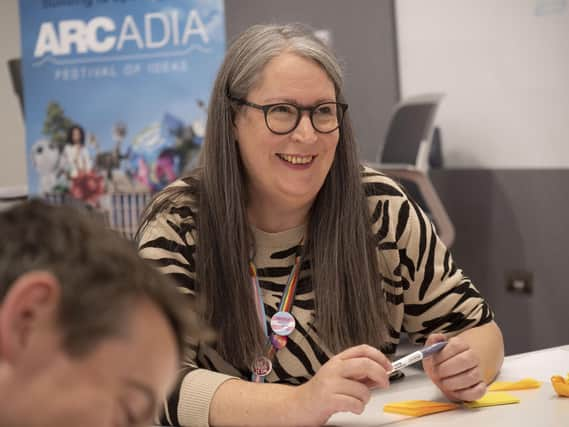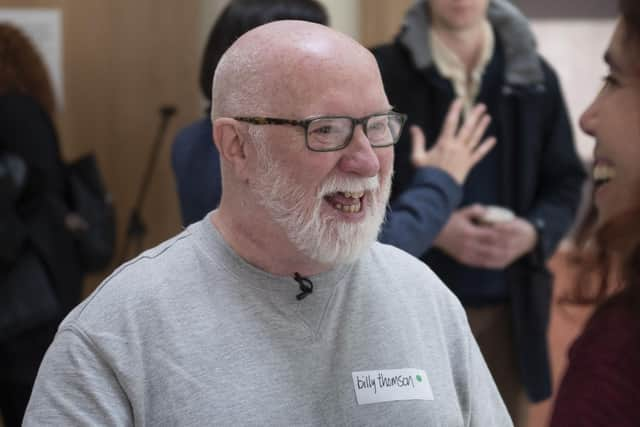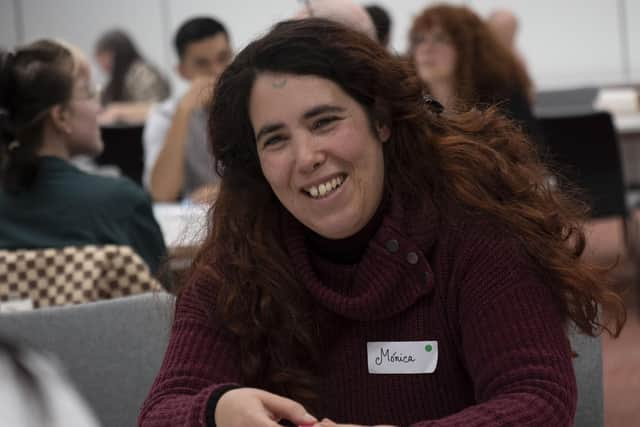There’s only so many times you can hear 'go away and die': Why is there still a stigma around living with HIV?


Millar went on to make a full recovery. Her doctors were mystified by her illness. Many tests were carried out, but found nothing. “They said: ‘Ok, you’re safe, off you go and enjoy your life’,” she says. It wasn’t until the following March that a former sexual partner contacted her to say she should take an HIV test. She did, and it came back positive.
In the early 2000s, Millar had shared a house with someone who was HIV positive, so thought she would be prepared for what was to come. “But it’s completely different when it’s happening to you,” she says. “Back then [though not now], they wouldn’t put you on medication unless your CD4 count dropped before a certain level.” For three and a half years, hers was above the threshold. “During that time, I was an infectious person. Sex was off the cards because, for me, it was too great a risk to engage, and obviously that has a knock-on effect on your mental health and how you see yourself."
Advertisement
Hide AdAdvertisement
Hide AdSo much has changed since the early days of HIV. When Millar’s friend was diagnosed, he needed so much medication, he brought it home in a bin bag. Now, Millar takes just one pill a day.


“I can take that pill at any time, with or without food,” she says. “It doesn’t give you the upset stomachs or headaches or nausea or fatigue it used to. And there are different medications out so, if you do suffer a side-effect, you can speak to your clinician and change.”
And yet, there are other aspects of life that remain challenging. Those who are on effective medication become “undetectable,” which means virologists can no longer detect HIV in their blood. Once you have been undetectable for at least three months, you cannot pass on HIV through sex . Yet, despite campaigns such as U=U (Undetectable = Untransmissable) and Can’t Pass It On, this is not widely understood.
According to a 2019 survey, 41 per cent of Britons believe everyone living with HIV can pass on the virus and 64 per cent would feel uncomfortable having sex with someone living with HIV even if they were on effective treatment. Almost 50 per cent would feel uncomfortable kissing someone living with HIV, while 38 per cent would feel uncomfortable going on a date with someone who is HIV positive.
Millar, 46, experiences abuse while online dating. “I feel obliged to tell people because I want them to have informed consent, but also I don’t want them to find out afterwards because, even though they are not at risk, they may react violently. I can get quite nasty messages. There’s only so many times you can hear 'go away and die' before you think 'Ok, maybe I will just delete this app’."


As science has advanced, so too have the efforts to eradicate blood-borne viruses (BBVs) such as HIV and Hepatitis C. The Scottish government has an ambitious target to eliminate Hep C by 2024, and the transmission of HIV, by 2030. Elimination of HIV transmission should be helped by the expansion of opt-out testing in healthcare settings across the country. Where this has been introduced, patients are routinely screened for HIV (unless they opt out), resulting in earlier diagnosis and treatment.
But campaigners like Millar, who works with the Terrence Higgins Trust’s Peer Support Scotland project, believe public beliefs about HIV are stuck in the 80s, and that more must be done to address misconceptions if the targets are to be reached.
At a workshop attended by researchers, funders, charities, Public Health Scotland and service users, those living with HIV point out the last public information adverts about Aids/HIV - the ones with the tombstone and the iceberg - date back to 1987. At the same time, many drama series such as It’s A Sin, while excellent, are set in the late 80s/early 90s.
Advertisement
Hide AdAdvertisement
Hide Ad“The opt-out testing is great because, the sooner you get tested, the sooner you know your status, the sooner you can get on medication and become undetectable and not pass it on to anyone else," says Millar. “But, if the Scottish government is serious about eliminating transmission, then people need to be better informed.”
According to Public Health England, a third of those living with HIV in the UK are women. But Millar says, thanks to the old adverts, and tabloid reporting of the 80s, most people still associate the virus with gay men. Some don’t get tested because they don’t know they are at risk. “Others are afraid to come and get tested because they are afraid of the outcome,” she says. “They think: ‘I am going to get Aids and die’. They don’t understand things have moved on,” she says.
“There have been more than 30 TV ads about Covid. I fully support that. We know, from the vaccine take-up, that public messaging works. But we need to be informed about HIV, too, and that is not happening. If we can have 30 ads about Covid during the pandemic, then surely we can have another one about HIV after 35 years.”
The workshop at Glasgow University is part of a wider project, Unseen Hands - a partnership between the MRC-University of Glasgow Centre for Virus Research (CVR) and the Terrence Higgins Trust Peer Support Scotland project. Unseen Hands brings virologists working on HIV and Hep C together with service users in an attempt to find common ground, and give those living with the viruses a voice in the research.
Many at the workshop share stories of ongoing stigma . Some, like Millar, rail against that stigma, becoming vocal campaigners. Others hide their status even from their closest friends. For a few, fear, disempowerment and isolation pushes them to the brink of suicide.
Billy Thomson was diagnosed with HIV in 2009 at the age of 50 after losing four stone. He was taken into hospital, where he remained for many weeks after contracting double pneumonia. At times, it was touch and go. Eventually, he was released on the condition that he wasn’t living alone. He soon found himself stripped of agency, as he moved round the country staying with one relative after another.
“One day, I had had enough,” he says. “I said to my sister: ‘Can you give me £2?’. I got the bus to Glasgow and went missing for two weeks, sleeping in doorways and under bridges. One day, I thought: ‘Time for this to finish.’ I was walking backwards and forwards along the Clydeside, and there was this wee woman sitting on a seat. You know how people say angels appear when you least expect them. Well, I have never been religiously-minded to that degree, but this woman walked up and said: ‘Are you OK, son?’. She bought me a cup of tea and I poured out my heart to her.”
It turned out the woman worked for the Samaritans. She took Thomson to the nearest office and asked if it was OK to contact his family. “It was the right time,” he says. “I think, with my disappearance, they realised I didn’t need the support they were giving me. I just needed to know if I needed them, they’d be there.” Gradually Thomson grew emotionally as well as physically stronger. He, too, now works for the Terrence Higgins Trust.
Advertisement
Hide AdAdvertisement
Hide AdThomson vividly recalls moments of stigma, such as the time he was told to come into hospital for an angiogram at 8am, and was still waiting at 3.15pm. “Finally the consultant comes up and says: ‘Sorry, about your wait, but due to your being HIV positive, we can’t take you until the end. It will be 5.15pm before we see you'. I asked: ‘What’s the reason behind that?’ He said: ‘Because we have to do an extreme clean’.”
Like Millar, Monica Marques, 44, had never thought herself at risk from HIV. She had only one partner, her estranged husband, who turned out to have been using drugs. By the time she received her diagnosis, at the age of 32, she was so ill she assumed she had terminal cancer. Marques’ diagnosis was made at the hospital she worked at, so everyone knew. At the same time, she was an only child living in a conservative village with a Catholic father who wanted her to keep her HIV status secret. “I moved to Scotland because I wanted to be anonymous," she says. "I travelled backwards and forwards from Portugal to get my medication, but, in Scotland, I worked anywhere I could find a job without having to disclose. I didn’t mind what I was doing. I just wanted to be Monica without HIV; to pay my bills, and not have too much on my mind.”
Eventually, though, this double life proved too much, and she decided to live openly. Now she is a volunteer with the THT, a researcher with the Hepatitis C and HIV charity, Waverley Care, and a Covid vaccinator with the NHS. “I am free now,” she says.
Working within the NHS, she has seen some of the discrimination first-hand: at dental surgeries where they have been unsure how to treat her, and with GPs. “They should all know better but there is not much training,” she says. “I have seen horrifying things in nursing homes. For carers who have not had any training being asked to go in and bath someone with HIV is scary.”
As for her own job, she disclosed her HIV status on application. “Every time I go to an interview, I tell them straight away because that’s the way I fight stigma,” she says. “But I know some HIV positive colleagues didn’t get this job because of their status.”
So, Marques is able to give Covid jags; but Millar found herself stigmatised when she went to receive one. People living with HIV were prioritised for Covid vaccines, so she attended the clinic alongside much older people. “The nurse asked me why I was there. I told her and, before I could say anything else, she left the table saying: 'I need to get gloves'.”
The nurse spoke to her supervisor, who asked Millar if she was on medication, and "undetectable". When she said yes to both, the nurse was told to carry on. “I said to [the nurse]: ‘You made a massive assumption. You told me you were afraid to touch me with your bare hands. No-one else in this vaccination centre is wearing gloves. Gloves would not prevent you from getting a needle-stick injury and, even if you had a needle-stick injury from dealing with me, it would not give you HIV’.”
All three place the blame for discrimination, not with the individuals, but with a lack of training. “There are organisations which can deliver that training, but it’s up to the Scottish government to fund and [commission] it,” Millar says.
Advertisement
Hide AdAdvertisement
Hide AdA spokesperson for the Scottish government said: “We have commissioned an expert-led report on how to eliminate HIV transmission by 2030, and, among its recommendations, is a focus on improving education and tackling stigma. The final report will be published shortly, along with details on how the Scottish government will take it forward.”
But those at the workshop believe close collaboration between all parties is necessary for progress to be made.
Faye Watson, formerly the engagement and communications coordinator for the CVR, who led the event, says an action group will meet every six months to hold everyone who took part to account for issues discussed there.
“There are also going to be discussions between the Hepatitis C Trust and Public Health Scotland because, in England, the Hepatitis C Trust is partnering with the NHS to deliver the eradication plan, and that’s not happening here,” she says.
Meanwhile, Millar insists the Scottish government needs to focus more on myth-busting. “They need to sort out education in schools, and filter it through the NHS and the wider public,” she says.
“Elimination of HIV transmission is possible, but only if people are informed; only if they know about the risks and the importance of testing. They need to know that, while some people will find out they are positive, [there is effective medication now] and it will be OK.”
Comments
Want to join the conversation? Please or to comment on this article.